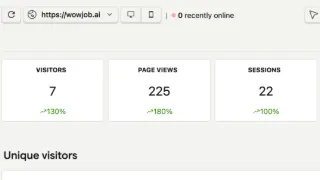and generate revenue that empowers you to have the flexible lifestyle you have dreamed of, be it to push at max for high profits or balance it for family time.
and reduce bounce rates, increase client conversion and rocket boost your business you're to dream-level, focusing your time to master your brand voice growth
crashes, integrate AI in the creating process and output 100% human-crafted content that boosts impressions by thousands, and implement strategies to cut
after a long year of working on a site project for a custom CMS powered by AI
on time and to the highest standard is my primary function, acting as a great enabler for delivery leads by producing a consistently high work rate and an
development will make a great addition to your team, delivering visually stunning, jaw-dropping results while making the entire collaborative process feel
through relentless research and development is the key success factor that will position your business at least one step ahead of the competition, as I am a
difficult situations and solving complex problems on time is my primary commitment, leveraging a deep technical background in web development to guarantee that
developing sophisticated applications for a diverse global clientele ensures your project is built with proven expertise and strategic insight from the outset
will be an immediate asset to your development team, consistently delivering creative and inventive solutions that will amaze you as I expertly dismantle even
development process easier and more enjoyable for your team is my specialty, ensuring that complex projects are not only delivered with precision but also
Tech Lead guarantees your company benefits from a professional who stands out for a superior work
projects into highly organized, efficient, and manageable steps guarantees a smooth and transparent
with an unparalleled work ethic, ensures your project is handled by a reliable, creative, and resourceful professional dedicated to achieving superior results
invaluable time while adding significant, measurable value to your work, leveraging standout communication skills and deep-seated confidence to accelerate your
and efficient frontend architecture is my core strength, ensuring your project is built on a foundation of strategic thinking and meticulous planning that
optimization can revolutionize your business, delivering a flawless Google-optimized website with a perfect 100/100 performance score that immediately drives
unlock revenue streams through optimized sites achieving flawless SEO and 100/100 PageSpeed scores, driving traffic surges and client engagements while guiding
I simply hate when my application gets ghosted and I'm sure you're tired of your CV getting lost in hundreds of applications. I've built a journey assisted by AI that is ...
audience what people have been saying about my work on LinkedIn, Facebook, Google and see if we are on the same page in terms of effort and impact
so I'll share the why I need one and my thought process journey
improve the quality, and get much much better results? I mean, is this even possible? And if it is, what questions should I ask myself?
A weekly dive into the portal’s analytics and social reach, tracking the journey toward more clients and stronger brand influence.
is something you might know about, as most web developers have to deploy at some point to production
And it creates two categories of people. Now it depends which one you fall in.

























